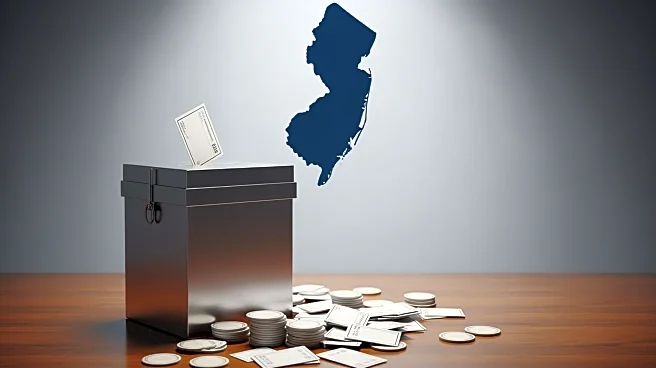What's Happening?
Nearly 1 million New Jersey residents have participated in early voting for the upcoming gubernatorial election, according to data from polling company Rasmussen. The early voting data reveals that approximately
514,500 Democrats, 279,000 Republicans, and 177,000 unaffiliated or independent voters have cast their ballots. Democratic candidate Mikie Sherrill appears to have an advantage over Republican candidate Jack Ciattarelli, as indicated by the early voting numbers. Political analyst Michah Rasmussen suggests that while Sherrill holds a lead, the race remains competitive, with Ciattarelli needing a strong turnout from Republicans and unaffiliated voters to close the gap. Both candidates are actively campaigning, with Sherrill distancing herself from current Governor Phil Murphy and Ciattarelli emphasizing dissatisfaction with Murphy's policies.
Why It's Important?
The early voting turnout in New Jersey's gubernatorial race is significant as it reflects the political engagement and potential voter sentiment in the state. The high number of early voters, particularly among Democrats, suggests a strong mobilization effort that could influence the election outcome. The race is seen as a test of Democratic strength in a state where they have traditionally held sway, but where Republican dissatisfaction with current policies could sway undecided voters. The involvement of high-profile figures like former President Barack Obama for Sherrill and President Trump's support for Ciattarelli underscores the national interest in this election, which could have implications for future political strategies and alignments in New Jersey.
What's Next?
As the election day approaches, both candidates are expected to intensify their campaigns to secure undecided voters and maximize turnout. Sherrill is likely to continue leveraging support from prominent Democrats, while Ciattarelli may focus on rallying Republican voters and appealing to independents. The final days leading up to the election will be crucial for both campaigns to solidify their messages and ensure voter turnout. The outcome of this election could provide insights into voter priorities and the political landscape in New Jersey, potentially influencing future elections and policy directions.








